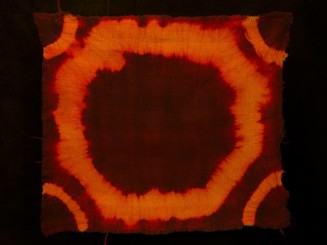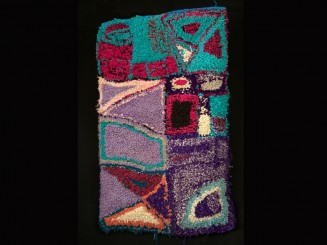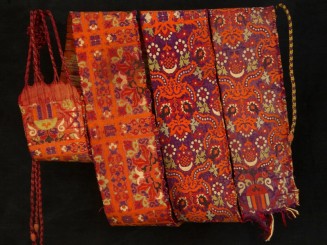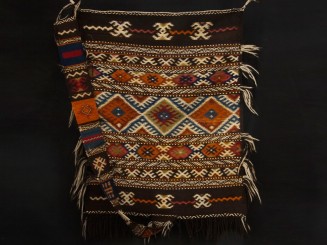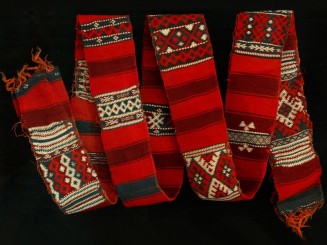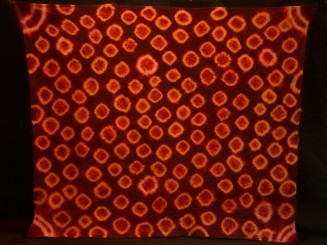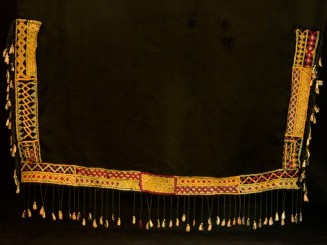Collector's
-
-MA0412-022
A stunning old Berber headscarf -Ilbed n´Tislatin or Ilbed n´Tghri- from the group of the Aït Atta in the Moroccan High Atlas. Tie-dyed wool. Though it is sometimes described as a bread cover its use is quite different. It is worn during the wedding celebrations as a headscarf tied with green silk straps and silver chains. It is very likely that its owner only wore it once at her wedding. A true piece of Berber art. Mid-XXth century or earlier.
-
Price €580.00MA1009-015
A stunning woman's old ceremonial veil or headscarf from the Berber Ida tribes, most likely from the Ida ou Kensous or the Ida ou Zeddoute, inhabiting areas of the Moroccan Central Anti Atlas in the region of the Jbel Siroua. Hanndwoven in wool by artisan weavers and painted and dyed in three shades with henna in averu characteristic U-shaped pattern. Fringed at the bottom. It would have been used in special gathering by the women of the tribe as veils or to cover their heads and shoulders. A superb piece with truly captivating design and colors. A genuine true ethnographic jewel.
-
Price €225.00MA1010-722
A lively example of the Berber spirit, creative and thrifty. Nothing is wasted. This artisan piece is made on a plastic raffia sac where a series of re-used textile materials have been sewn and woven. The result is as stunning as this, both in terms of design and combination of colors. Pieces like this are used on a daily basis at home as kitchen or courtyard mats and as playgrounds for infants, the plastic surface acting as insulator. 1970's-80's.
-
Price €440.00MA1112-036
A superb Moroccan woman's silk antique city or citadine belt or sash -hezam o hzam- from Tetouan or, possibly, Fes. It features a wonderful woven work with an incredibly rich combination of colors and decorative motifs that show a clear influence from Andalousia. Among these motifs there are flowers, fruits and khamsa motifs at both ends. A usual feature of these pieces is the combination of at least two main designs, very often four, with contrasting colors. However when worn only of the designs is visible. Likewise it is common that the background color changes in the middle of the sash. With fringe. Wear commesurate with age. Early XIXth century. A great collector's piece.
-
-MA0400-847
A sublime old Berber bag or -l'rhomd- from the tribe of the Aït or Ait Ouaouzguite inhabiting the Siroua mountains in Morocco. Flatwoven wool combining wonderful colours and featuring a characteristic array of geometric motifs. These motifs are not only decorative but serve a more important purpose such a protecting its owner from bad influences and ward evil eye off. The use of this kind of pieces is described in Niloo Imami Paydar et al's "The Fabric of Moroccan Life": "The type known as l'rhomd was used like a sea-bag. The opening of the bag is opposite the long carrying strap. This opening was then attached to the end of the strap. One hand was passed through the loop and the bag was thrown over the shoulder. The shepherds used simple bags of this kind as food bags when roaming many weeks with the herds. But richly decorated pieces were not exposed to every day use; they were luxury pieces reserved for special ocassions, sometimes only produced for marriages". This one is certainly a dowry piece. The quality of its execution makes it one-of-a-kind and true collectors' piece.
-
Price €225.00MA1010-723
A most original sample of the Berber spirit, creative and thrifty. Nothing is wasted. This artisan piece is made on a plastic raffia sac where a series of re-used textile materials have been sewn and woven. The result is as spectacular as this, both in terms of design and combination of colors. Pieces like this are used on a daily basis at home as kitchen or courtyard mats and as playgrounds for infants, the plastic surface acting as insulator. A true -avant garde- piece of tribal art. 1970's-80's.
-
Price €225.00MA1010-721
A stunning example of the Berber spirit, creative and thrifty. Nothing is wasted. This artisan piece is made on a plastic raffia sac where a series of re-used textile materials have been sewn and woven. The result is as spectacular as this, both in terms of design and combination of colors. Pieces like this are used on a daily basis at home as kitchen or courtyard mats and as playgrounds for infants, the plastic surface acting as insulator. A piece that is a piece of art on its own right. 1970's-80's.
-
Price €285.00MA1010-719
An outstanding sample of the Berber spirit, creative and thrifty. Nothing is wasted. This artisan piece is made on a plastic raffia sac where a series of re-used textile materials have been sewn and woven. The result is as remarkable as this, both in terms of design and combination of colors. Pieces like this are used on a daily basis at home as kitchen or courtyard mats and as playgrounds for infants, the plastic surface acting as insulator. Very original. 1970's-80's.
-
Price €290.00MA1099-245
An old saddle bag from the Zaiane that is a true gem. The Zaiane or Zaïane inhabit areas of the Middle Atlas mountain range in Morocco. Their textiles are well-known for their quality and design and the richness of their palette. This is an outstanding example. It combines naturally dyed hand-woven wool, showing the characteristic motifs of this group that reflect the vastness of Berber symbology, cotton fringes and silk tassels. Certainly a collectors' piece. It is would be madness to let it go. 1930's.
-
Price €175.00MA1009-007
An absolutely covetable old flat woven tend or -jaima- band from the Berber tribe of the Zaïane inhabiting the Middle Atlas Mountains in Morocco. It is made of sheep wool, goat hair and cotton. It features the wonderful work and rich design for which the Zaïane are deservingly among the most reputed weavers in Morocco. The decoration included a wide array of Berber geometric motifs, all of them having a strong prophylactic purpose, such as diamond grid, zigzags, triangles, etc. These kind of bands are used as an element to brace the walls and other parts of the traditional -jaima- and prevent collapsing. Superb.
-
Price €175.00MA1009-008
A great old flat woven tend or -jaima- band from the Berber tribe of the Zaïane inhabiting the Middle Atlas Mountains in Morocco. It is made of sheep wool, goat hair and cotton. It features the wonderful work and rich design for which the Zaïane are deservingly among the most reputed weavers in Morocco. The decoration included a wide array of Berber geometric motifs, all of them having a strong prophylactic purpose, such as diamond grid, zigzags, triangles, etc. These kind of bands are used as an element to brace the walls and other parts of the traditional -jaima- and prevent collapsing. Extremely decorative piece of ethnographic art.
-
Price €450.00MA1002-376
A woman's outstanding old wool and silk woven belt -hzam- from the Berber tribe of the Aït Ouarda a sub-group pf the Aït Ouaozguite inhabiting the region of the Siroua between the High Atlas and the Anti Atlas mountains in Morocco. They get the material for their characteristic woven pieces from a breed of sheep indigenous to that area and well-adapted to the harsh environment. Ouaouzguite women have always being reputed for their outstanding weaving skills and inventive combining color, textures and motifs. Natural dyes for their pieces were obtained from flowers, roots, etc. growing in the surroundings and indigo was often obtained from the not far away Dades Valley. The use of this latter dye was very demanding and complex but was mastered soon by Jewish members of the community. Broad wowen belts like this one were used on a daily basis by the women of the group. This one though is made of a richer material, silk, and features a wonderful combination of natural dyed colours as well as decorative motifs including the protective eye and other anthropomorphic figures and symbols, often related to fertility and maternity. A piece to grab.
-
Price €450.00MA1002-375
A woman's stunning old wool and silk woven belt -hzam- from the Berber tribe of the Aït Ouarda a sub-group pf the Aït Ouaozguite inhabiting the region of the Siroua between the High Atlas and the Anti Atlas mountains in Morocco. They get the material for their characteristic woven pieces from a breed of sheep indigenous to that area and well-adapted to the harsh environment. Ouaouzguite women have always being reputed for their outstanding weaving skills and inventive combining color, textures and motifs. Natural dyes for their pieces were obtained from flowers, roots, etc. growing in the surroundings and indigo was often obtained from the not far away Dades Valley. The use of this latter dye was very demanding and complex but was mastered soon by Jewish members of the community. Broad wowen belts like this one were used on a daily basis by the women of the group. This one though is made of a richer material, silk, and features a wonderful combination of natural dyed colours as well as decorative motifs including the protective eye and other anthropomorphic figures and symbols, often related to fertility and maternity. A piece to grab.
-
Price €490.00MA0400-846
A woman's superb old woven belt -hzam- from the Berber tribe of the Aït Ouaozguite inhabiting the region of the Siroua between the High Atlas and the Anti Atlas mountains in Morocco. They get the material for their characteristic woven pieces from a breed of sheep indigenous to that area and well-adapted to the harsh environment. Ouaouzguite women have always being reputed for their outstanding weaving skills and inventive combining color, textures and motifs. Natural dyes for their pieces were obtained from flowers, roots, etc. growing in the surroundings and indigo was often obtained from the not far away Dades Valley. The use of this latter dye was very demanding and complex but was mastered soon by Jewish members of the community. Broad wowen belts like this one were used on a daily basis by the women of the group. This one features a wonderful combination of basic colours of the Berber's palette, namely, indigo blue, shades of red and white. All of them obtained from natural dyes but for the white from valued natural cotton. A couple of motifs are made in silk. The decorative motifs include the protective eye and other anthropomorphic figures and symbols, often related to fertility and maternity. Small tears commesurante with age and use. Late XIXth century or early XXth century. A collector's piece.
-
Price €175.00MA0400-845
A great woman's old woven belt -hzam- from the Berber tribe of the Aït Ouaozguite inhabiting the region of the Siroua between the High Atlas and the Anti Atlas mountains in Morocco. They get the material for their characteristic woven pieces from a breed of sheep indigenous to that area and well-adapted to the harsh environment. Ouaouzguite women have always being reputed for their outstanding weaving skills and inventive combining color, textures and motifs. Natural dyes for their pieces were obtained from flowers, roots, etc. growing in the surroundings and indigo was often obtained from the not far away Dades Valley. The use of this latter dye was very demanding and complex but was mastered soon by Jewish members of the community. Broad wowen belts like this one were used on a daily basis by the women of the group. This one features a wonderful combination of natural dyed colours and decorative motifs including the protective eye and other anthropomorphic figures and symbols, often related to fertility and maternity. It also shows areas where the main motif is a serie of bands against a dark background which is also very typical in other pieces of this group such as food bags -adil-. A piece to enjoy.
-
-MA0400-844
A woman's beautiful old wool and cotton woven belt -hzam- from the Berber tribe of the Aït Ouaozguite inhabiting the region of the Siroua between the High Atlas and the Anti Atlas mountains in Morocco. They get the material for their characteristic woven pieces from a breed of sheep indigenous to that area and well-adapted to the harsh environment. Ouaouzguite women have always being reputed for their outstanding weaving skills and inventive combining color, textures and motifs. Natural dyes for their pieces were obtained from flowers, roots, etc. growing in the surroundings and indigo was often obtained from the not far away Dades Valley. The use of this latter dye was very demanding and complex but was mastered soon by Jewish members of the community. Broad wowen belts like this one were used on a daily basis by the women of the group. This one features a wonderful combination of natural dyed colours and decorative motifs including the protective eye and other anthropomorphic figures and symbols, often related to fertility and maternity. A truly appealing piece.
-
Price €230.00MA0412-029
A fantastic old shoulder or head scarf or - agounoun- from the Berber group of the Aït Hadiddou in the Central High Atlas in Morocco. The -agounoun- was a part of a bride's attire at her wedding and it was used as a shawl at the top of the shoulders or head under additional garments and headgear. Then she would not probably use it anymore in her lifetime. It was usually made from an old piece of wool that was then tie-dyed in two colours. A wonderful and authentic ethnic treasure to enjoy and cherish. Mid-XXth century or earlier.
-
Price €275.00MA0412-027
A most original old Berber headscarf -Ilbed n´Tislatin or Ilbed n´Tghri- from the group of the Aït Atta in the Moroccan High Atlas. Tie-dyed wool. Though it is sometimes described as a bread cover its use is quite different. It is worn during the wedding celebrations as a headscarf tied with green silk straps and silver chains. It is very likely that its owner only wore it once at her wedding. The design of this particular piece is very original which makes it very interesting. Mid-XXth century or earlier.
-
Price €225.00MA0412-026
A great old Berber headscarf -Ilbed n´Tislatin or Ilbed n´Tghri- from the group of the Aït Atta in the Moroccan High Atlas. Tie-dyed wool. Though it is sometimes described as a bread cover its use is quite different. It is worn during the wedding celebrations as a headscarf tied with green silk straps and silver chains. It is very likely that its owner only wore it once at her wedding. A fantastic piece of ethnic tribal art. Mid-XXth century or earlier.
-
Price €195.00MA0412-025
An eye-catching old Berber headscarf -Ilbed n´Tislatin or Ilbed n´Tghri- from the group of the Aït Atta in the Moroccan High Atlas. Tie-dyed wool. Though it is sometimes described as a bread cover its use is quite different. It is worn during the wedding celebrations as a headscarf tied with green silk straps and silver chains. It is very likely that its owner only wore it once at her wedding. A true piece of Berber art. Mid-XXth century or earlier.
-
-MA0611-552
A superb old veil or shawl made of cotton and silk embroidery from the Berber group of the Aït Ouaouzguit inhabiting in the Moroccan Anti Atlas. Wonderdul embroidery work. Similar samples, yet not that old, may be seen in M.R. Rabaté et al: -Berber Costumes of Morocco. Traditional Patterns- pag. 67, 69, 173-175. Early XXth century.
-
-MA0412-028
A great old shoulder or head scarf or - agounoun- from the Berber group of the Aït Hadiddou in Central High Atlas in Morocco. The -agounoun- was a part of a bride's attire at her her wedding and it was used as a shawl at the top of the shoulders or head under additional garments and headgear. Then she would not probably use it anymore in her lifetime. It was usually made from an old piece of wool that was then tie-dyed in basically two colours. The characteristic design of a large circle surrounded by smaller oners would be referred to a the -stars and the moon-. A lovely piece of ethnic art. Mid-XXth century or earlier.
-
Price €250.00MA0303-011
A great old shoulder or head scarf or - agounoun- from the Berber group of the Aït Hadiddou in Central High Atlas in Morocco. The -agounoun- was a part of a bride's attire at her her wedding and it was used as a shawl at the top of the shoulders or head under additional garments and headgear. Then she would not probably use it anymore in her lifetime. It was usually made from an old piece of wool that was then tie-dyed in basically two colours. The characteristic design of a large circle surrounded by smaller oners would be referred to a the -stars and the moon-. A lovely piece of ethnic art. Mid-XXth century or earlier.

